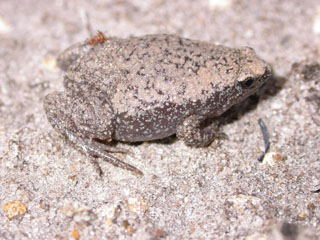
The Microhylidae, commonly known as narrow-mouthed frogs, are a geographically widespread family of frogs. The 683 species are in 57 genera and 11 subfamilies.

Plethodontohyla is a genus of microhylid frogs endemic to Madagascar.

The Microhylinae are a subfamily of microhylid frogs. It contains 9 genera. Phylogenetic studies have estimated the family Microhylidae to be about 52 million years old.

Austrochaperina is a genus of microhylid frogs found on New Guinea, New Britain and Australia.

Choerophryne is a genus of microhylid frogs, commonly known as Torricelli mountain frogs, endemic to New Guinea. These frogs are small, with the body length measured from snout to vent between 11 and 23 mm.
Copiula is a genus of microhylid frogs endemic to New Guinea. The common name Mehely frogs has been coined for them. They are leaf-litter inhabitants.
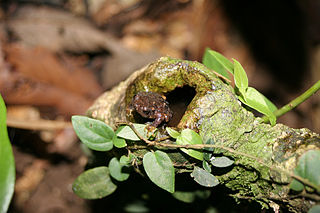
Metaphrynella is a small genus of microhylid frogs from the southern Malay Peninsula and Borneo. They are sometimes known as the Borneo treefrogs or tree hole frogs. The common name refers to the microhabitat of these frogs: males call from tree holes and tadpoles develop in the water contained in those holes.

Uperodon montanus, also known as Jerdon's narrow-mouthed frog, Jerdon's ramanella, mountain dot frog, mountain globular frog, or Malabar Hill frog, is a species of narrow-mouthed frog endemic to the Western Ghats of India.

Uperodon taprobanicus, also known as the Sri Lankan bullfrog, Sri Lankan painted frog, Sri Lankan kaloula, Ceylon kaloula, Indian painted frog, or painted globular frog, is a species of narrow-mouthed frog found in Nepal, Bangladesh, southern and eastern India, and Sri Lanka up to an altitude of about 1300 metres. It can grow to an adult length of up to 75 millimetres(7.5 cm) long from snout to vent. It was originally described as a subspecies of Kaloula pulchra, ssp. taprobanica. The IUCN lists it as being of "Least Concern".
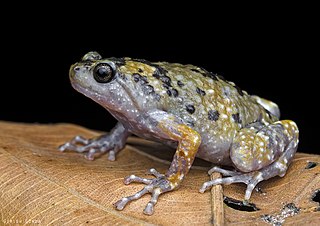
Uperodon mormorata, also known as the Indian dot frog, marbled ramanella, dark-banded frog, and mottled globular frog, is a species of narrow-mouthed frog endemic to the Western Ghats of southwestern India. It was previously placed in the genus Ramanella. It has only been reported from three locations, though locally found in some numbers.

Uperodon triangularis is a species of narrow-mouthed frog found in southwestern India. They are endemic to the Western Ghats, where they are known to breed in water collected in tree hollows. The advertisement calls of males is made up of about 30 pulses of 0.38 second duration with a frequency range of 0.6 and 1.1 kHz. These are emitted every three seconds.

Uperodon variegatus, also known as the Eluru dot frog, termite nest frog, variable ramanella, variagated ramanella, white-bellied pug snout frog, or variagated globular frog, is a species of narrow-mouthed frog that is endemic to India. Earlier records from Sri Lanka refer to what is now known as Uperodon rohani. They are seen mostly in the monsoon season when they may enter homes. They are small in size and the variegated markings and the genus characteristic of having pads on the fingertips but not on their toes make them easy to identify.
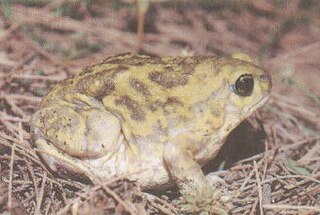
Uperodon systoma is a species of narrow-mouthed frog found in Pakistan, India, Nepal, and Sri Lanka. It is known under many different common names: indistinct frog, marbled balloon frog, and lesser balloon frog.

Glyphoglossus is a genus of frogs in the family Microhylidae. The genus occurs in Southeastern Asia. Common name balloon frogs has been coined for it, whereas the common name squat frogs refers to the Calluella species that are now included in this genus. They are fossorial frogs that spend only limited time on the soil surface and are typically known from only few specimens.
Uperodon nagaoi, also known as the Nagao's pug-snout frog or Nagao's globular frog, is a species of frogs in the family Microhylidae. It is endemic to Sri Lanka and is known from the Central, Sabaragamuwa, Southern, and Western Provinces. The specific name nagaoi honours Eijiro Nagao, president of Marusan Securities who, through the Nagao Environmental Foundation, has supported research on Sri Lankan amphibians.
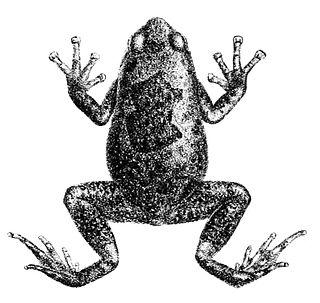
Uperodon obscurus is a species of frog in the family Microhylidae. It is endemic to Sri Lanka. Its natural habitats are subtropical or tropical moist lowland forests, subtropical or tropical moist montane forests, freshwater marshes, intermittent freshwater marshes, rural gardens, and heavily degraded former forest.

Pseudophilautus variabilis, also known as the variable bush frog or variable bubble-nest frog, is a species of frog in the family Rhacophoridae. This now extinct species was endemic to Sri Lanka. Despite extensive searches in recent times, it is only known from collections prior to 1858. The reasons for its disappearance are unknown but probably involve habitat loss.

Pseudophilautus is a genus of shrub frogs in the family Rhacophoridae endemic to the Western Ghats of southwestern India and to Sri Lanka where the majority of the species are found. Many of them are already extinct. On the other, some species believed to be extinct have also been rediscovered.

Rohanixalus is a genus of tree frogs in the family Rhacophoridae native to the Andaman islands and Indo-Burma region. The genus was established in 2020 by Indian herpetologist S.D. Biju of the University of Delhi and his colleagues. The genus comprises eight species.

















